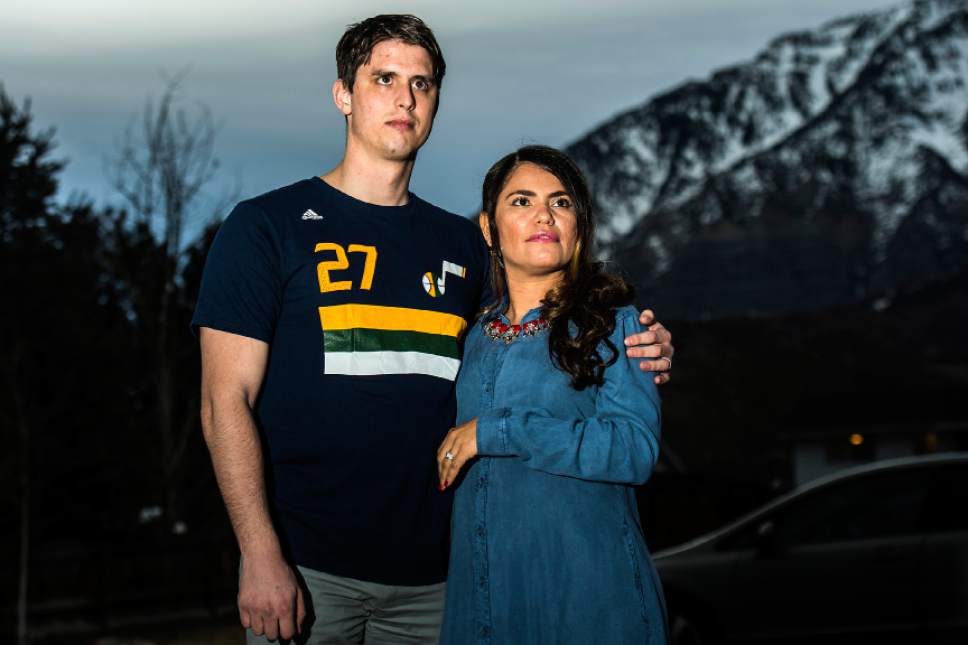This is an archived article that was published on sltrib.com in 2017, and information in the article may be outdated. It is provided only for personal research purposes and may not be reprinted.
Utah's immigrant community is in a state of panic after federal raids in five cities across the U.S. netted 680 undocumented immigrants who, most likely, will be deported.
"It has created a lot of fear, particularly with people with mixed-status families," said Mayra Cedano of Comunidades Unidas. "People don't feel safe in their own homes or in their own communities."
The recent raids have affected people with and without documents. "Legal, permanent residents, people who have been here for generations, fear for their friends and families," Cedano said.
One such undocumented resident is Pamela, who asked to be identified only by her first name because she fears deportation. She came from Peru at age 10, with her mother and younger sister. She graduated from a high school in Ogden and later earned two bachelor's degrees from the University of Utah. She is slated to complete a master's program at Old Dominion University, in Norfolk, Va., in May, she said. Yet, her future is uncertain.
Pamela is a so-called "dreamer" and was able to stay in this country legally through Deferred Action for Childhood Arrivals (DACA). When President Barack Obama enacted the policy in 2012, she was excited because "finally," she said, the country was recognizing her existence and giving her a way to go to school, work and build a life.
Earlier this month, she happily watched as her mother and younger sister were sworn in as U.S. citizens at the federal courthouse in Salt Lake City. But she wasn't given the chance.
"It was sort of a relief moment," she said, "that after so long they were able to not live in fear anymore, to have full rights as American citizens and be able to exercise those rights. It was really emotional. It was a day of joy and excitement, and I was just really happy for them."
As families are being separated and more undocumented immigrants are being detained — including one person with DACA status in Washington state — the situation is becoming "really scary" for people like Pamela.
She hasn't been back to Peru since she came to the U.S. as a child and the family she knows lives here, she said, but there is a chance now that they could be separated.
"I've gone to school here. I've gotten married here," she said. "My life is here."
But officials at Immigration and Customs Enforcement (ICE) say last weekend's operations were nothing out of the ordinary.
Carl Rusnok, a regional spokesman for ICE, said that arrests and immigration enforcement operations occur daily nationwide. "They're getting criminal aliens off the streets, for goodness sakes," he said.
The uproar is the product of misleading information from groups and media outlets that have been irresponsible, he said, labeling it "fear-mongering."
Immigrant advocates, however, see the fear-mongering coming from the Trump administration, said Richard Jaramillo, president of Utah Coalition of La Raza. "The fear is palpable after all the rhetoric from President [Donald] Trump during the campaign."
Trump has said he will deport 3 million Mexican immigrants, but only the "bad ones."
Activists say that, under the Obama administration, ICE largely went after immigrants who had been jailed for felonies. On Jan. 25, the Trump administration expanded the scope of those targeted to include immigrants with minor offenses or no convictions at all. The recent operations included raids at workplaces and homes.
Although the Trump administration has said it is targeting only criminals, others also are being swept up, Jaramillo said. "When you put out a wide net, you catch many without criminal records."
Michael Keith and his wife, Claudia, live in Orem and say they know the fear too well. Claudia now has a green card, but spent years in the U.S. illegally.
She was hesitant to talk with The Salt Lake Tribune but Michael shared her story.
Claudia originally came to the U.S. legally from Brazil to study English, but even though "she did everything right" to renew her visa, he explained, she "fell out of legal status."
They lived in constant fear she would be deported.
Eventually, Claudia's lawyer recognized that immigration officials who processed her visa renewal were at fault for the mix-up.
It was an "unfair experience," Michael said.
Although he knows a lot of people in the U.S. illegally are scared, Michael said there is more "anger and disgust" about the inhumane way they are treated and talked about.
Among those caught up in the frenzy are children of undocumented immigrants, said Jennifer Mayer-Glenn, director of family-school collaboration for Salt Lake City School District. Their primary concern is that their parents will be deported.
"Kids have trouble working on schoolwork when they are worried," she said. "Fear has a physical impact on the brain and learning."
Some elementary teachers have reported students breaking out in tears during class, Mayer-Glenn said.
Before last weekend's raids, undocumented immigrants believed they would not be deported if they did not commit a crime, she said. Now they are afraid to leave their homes.
The Salt Lake City School District is offering workshops for students and parents in hopes of assuaging fears.
The district and other of organizations urge families with undocumented members to make a plan for what to do if someone close to them is detained. If a parent is arrested, the spouse and children should know where to go for support. Elli, a Salt Lake City resident, is a U.S. citizen by birth, but recognizes the dire situation of illegal immigrants. She asked to be identified by a nickname to protect her stepcousin.
He was brought here when he was about 8 years old. His mother's papers are in order. She married Elli's U.S. uncle and has other children with him, who are citizens. They have spent thousands of dollars trying to obtain legal status for the cousin, Elli said, but haven't succeeded.
Now a teenager, he frets he's going to be deported, she said, and will have to live with extended relatives he hasn't seen in years.
The Trump administration's policies will push immigrants back into the shadows, said Aden Batar, director of immigration and refugee resettlement for Catholic Community Services.
Immigrants should know their rights, Batar said. Lawyers and Catholic Community Services and Comunidades Unidas are available to help.





